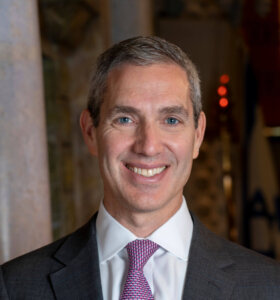What I wish I had said to a young non-Zionist Jew about Israel
On Israel’s 75th birthday, your questions are exactly what we need

People holding banners and Israeli flags gather to protest Israeli Finance Minister Bezalel Smotrich outside the Grand Hyatt Hotel where he attends a conference amid an official boycott following his comments on wiping out a Palestinian village of Huwara, in Washington D.C., March 12, 2023. Photo by Celal Gunes/Anadolu Agency via Getty Images
My daughter’s best friend is a proud Jew: She was educated in Jewish day schools, spent summers at Jewish camp, was part of synagogue youth groups and participated in countless Israel programs. Her father was born in Israel, her mother is a powerhouse Jewish communal volunteer. She is smart, funny, active in her university Hillel, deeply compassionate and passionate about the Jewish people.
So I was caught off guard when she recently asked whether Park Avenue Synagogue, where I am senior rabbi, has an Israeli flag on its bimah and recites the prayer for the State of Israel on Shabbat. Yes to both, I said, then prodded a bit: “What is it you are really asking?”
What poured out of her mouth sounded like something of a manifesto. Zionism is a political ideology, she said. Synagogues that claim to be politically unaffiliated should not blindly promote it.
She went on to make the case that nationalism has, throughout history, generally been used to oppress and cause suffering, and that Jewish nationalism — Zionism — had very specifically oppressed and caused suffering to the Palestinians.
“A Jewish nation-state will never be able to uphold Jewish values,” she said. “There have always been non-Zionist Jews. It’s important to me that there be non-Zionist Jewish spaces because I want to practice Judaism and have a Jewish identity that does not involve nationalism.”
I was caught flat-footed. As Israel turns 75 this week, here’s what I wish I’d said.
You stand in good company
I hear you. Judaism is not Zionism and Zionism is not Judaism, and the flag on the bimah and the prayer for Israel are not uncomplicated things. There are some people who would call you an “un-Jew” for what you are saying, but those people need to calm down. Your voice is important and not only are you not alone, you stand in some very good Jewish company.
There is a long history of people who held what is called a non-statist view of peoplehood. Not self-hating or waiting-for-the Messiah Jews. Proud Jews — labor Zionists, cultural Zionists, even religious Zionists who had attachments to the land but did not believe we should establish a modern nation-state.
When political Zionism began to take hold in the late 1800s, it was rejected by Orthodox and Reform Jews alike. Even Theodor Herzl’s initial vision did not include a military, borders or many of the other trappings of today’s Israel. In fact, the first Zionist Congress in 1897 did not call for a state but a Jewish “national home, secured by public law.”
I agree that Zionism is not Judaism, and I regret that the organized Jewish community made it seem so.
But in the wake of the Holocaust, American Jewry’s support for Israel was critical. If we weren’t going to move there, then we were going to support those who did — philanthropically and politically. Israel advocacy became a tool for solidarity, a response to antisemitism and a prophylactic against assimilation.
Zionism as a litmus test
Somewhere along the way American Zionism became, in the words of the late Rabbi Arthur Hertzberg, a “substitute religion.” More problematically, it became a litmus test for Jewish loyalty; in Hertzberg’s words, “the lack of support for Israel being the only offense for which Jews can be ‘excommunicated.’”
Israel engagement and advocacy was used to paper over the thinness of American Jewish identity. I am a huge supporter of Israel travel and study, but if it is the most powerful lever we have to reinvigorate diaspora Jewish life, we have some serious soul-searching to do.
I understand that when you look at Israel — when I look at Israel, when anyone looks at Israel — we see a government that stands in breach of many of our values, including our Jewish values. Democracy, religious pluralism, gay rights, the Palestinian right to self-determination, the very values that your Jewish education has instilled in you.
I, too, am deeply worried about what will become of liberal Zionism should Israel cease to be a liberal democracy.
And how can I ask you to support an Israel that doesn’t even acknowledge you? More than half of young Israelis are either Haredi or Arab; for them, non-Orthodox American Jews like you and I are an abstraction. A typical secular Israeli expends zero psychic energy thinking about the shared destiny of the Jewish people. Diaspora Jews play no role in Knesset politics.
You’re not crazy for asking these tough questions. You’d be crazy if you didn’t.

Our eyes have always been turned toward Zion
But I never said that synagogues are apolitical. A good synagogue is not only a house of prayer, but a place that helps Jews wrestle with Jewish values. It should inspire them to see those values manifest in this world — sometimes through the instrument of politics. High on that list of values is engagement with Israel.
Despite the existence of non-Zionists throughout our history, I think it’s a profound misreading of that history to call Judaism anything other than a land-centered faith. From God’s first call to Abraham to our arrival in the Promised Land and through the exile; in the words and direction of our prayer and the aspirations we hold – our eyes have always been turned towards Zion.
That is why we have the Israeli flag on the bimah and why we recite the prayer for Israel. It is why I am a proud Zionist, why I am politically engaged on behalf of Israel and why I ask that my congregants be as well.
You are right that we live in a time when “nationalism” has become an ugly word. It is nice to imagine a world, as John Lennon did, “where there’s no countries” and “nothing to kill or die for.” But we live in the actual world, not an imagined one.
The rise of political Zionism reflects the belief that Jews have a moral right and historic need for self-determination within historic Palestine. To be the subject of our own sentence and not the object of someone else’s.
Israel is a part of my being
The world changed when the modern state of Israel was established on May 14, 1948. I can imagine traveling back in time to debate whether we should be Zionists in a 19th century Viennese coffee shop, just as I can imagine living in a world without penicillin. But I have no desire to do either.
Does Israel’s right of sovereignty clash with the Palestinian’s self-same right? Of course it does. Should Israel, no different than the Palestinians, be held responsible for its role in obstructing a two-state solution? Absolutely.
Israel is a deeply imperfect state. But given the choice of a sovereign and imperfect Israel or the moral purity of exiled victimhood, I would choose the former over the latter any day, and so should you.
To deny your own people the same rights you would fight for on behalf of others is an act of self-abnegation. We didn’t choose to live during this era of history in which a sovereign state of Israel exists, but we should be grateful that we do.
Israel is the greatest achievement of the Jewish people in the past century, if not the entirety of our existence. The expression of a multi-millennial hope, the home to half our people. Though I have chosen not to live there, to be a Jew means to understand Israel as a constituent part of my being.
We need your voice
Yet as Israel turns 75, it is not just troubled – it is on the brink. The fault lines have broken open before our very eyes: the future of its democratic institutions, the potential for a third intifada, the erosion of its standing in the community of nations, the bitter irony that it is in the Jewish state where liberal Jews like us cannot always practice our Judaism freely.
That is why hundreds of thousands of Israelis are protesting on the streets every week. Is some of this pain self-inflicted? Absolutely. Has the complicit silence of American Jewry helped enable it? I think we agree that it has. But let’s stop living in the past and start asking what we do now.
There are those who say that criticizing Israel is a sign of disloyalty. I say otherwise. Just as my activism as an American is an expression of my patriotism, not counter to it, so is my Zionism. If up to 500,000 Israelis can express their love for Israel by protesting its government, so can we.
Are you going to walk away and stand on the sidelines? Or are you going to leverage your voice, and put the piercing clarity of your conscience and Jewish values to work in order to spark change, fight for your ideals, and help Israel realize the fullness of its founding vision?
I not only hear you and your peers, I am proud of you. Not only do you have a place in the Zionist conversation, it is a conversation that depends on you. We might not always agree, but the community needs you.
And on its 75th birthday, Israel needs you.























